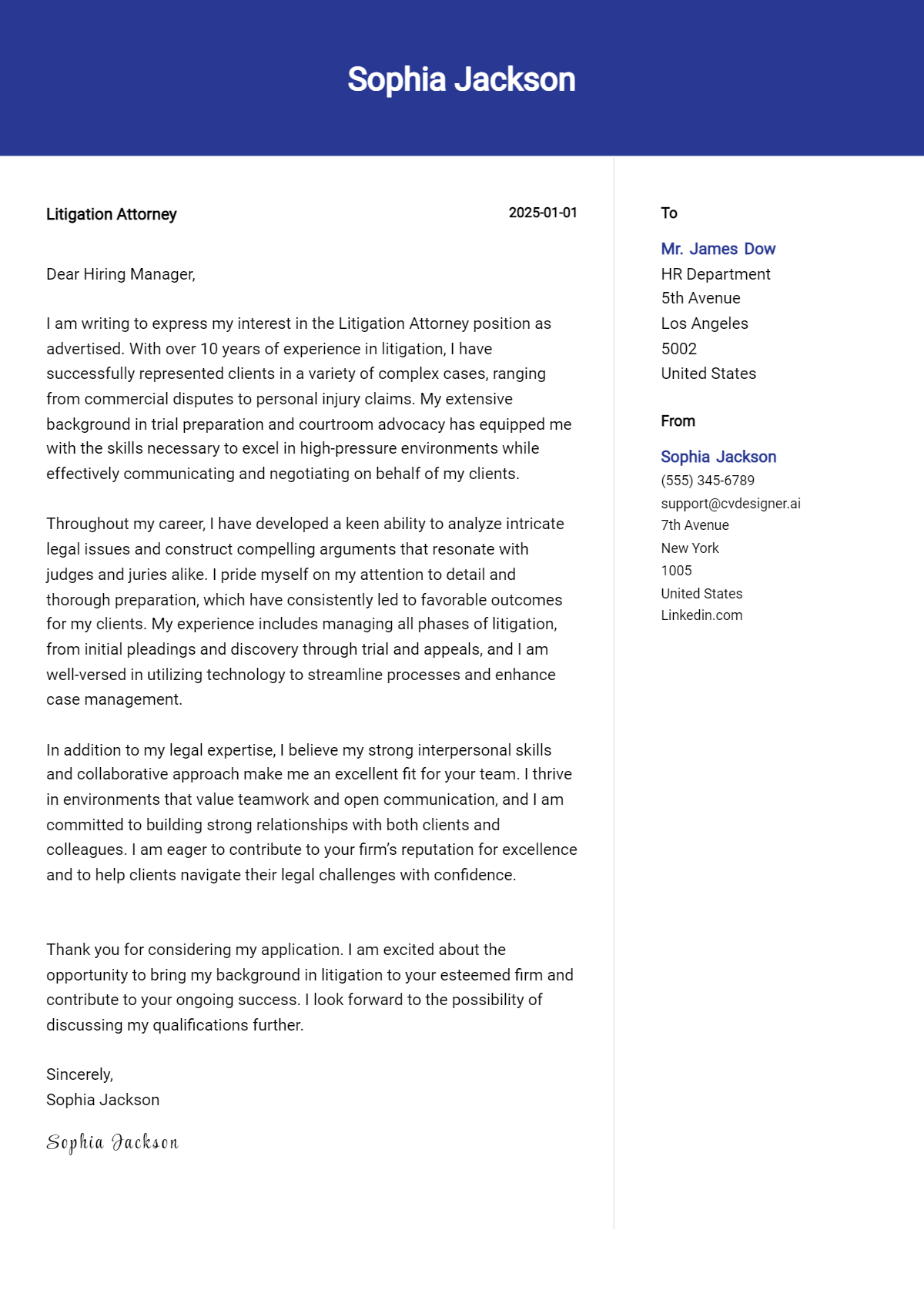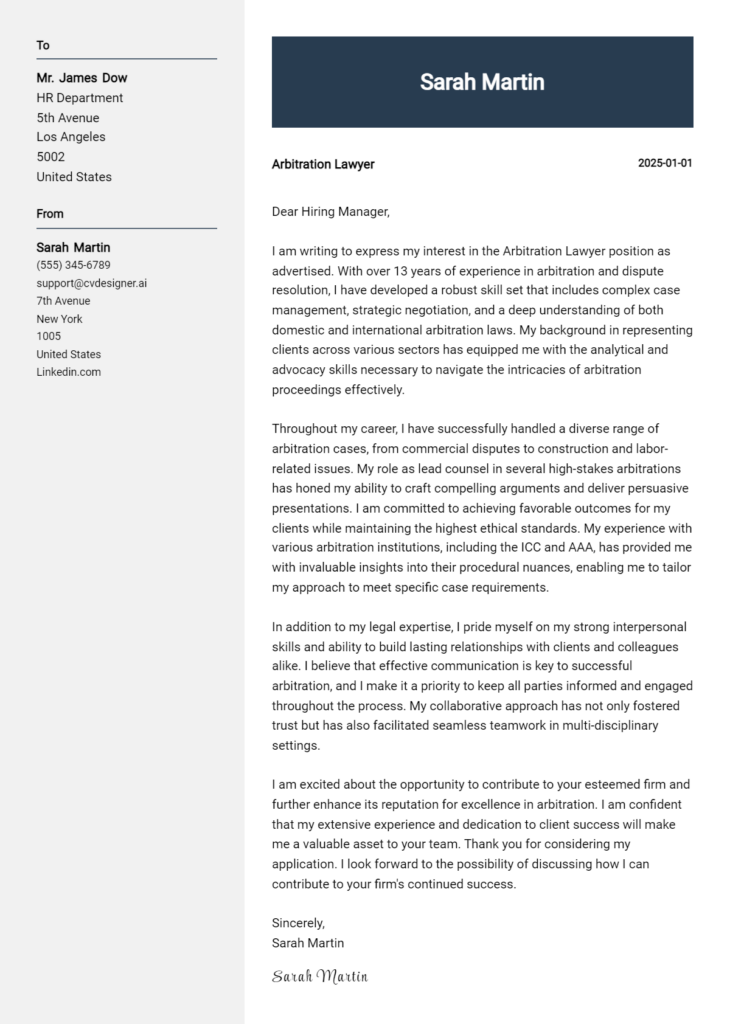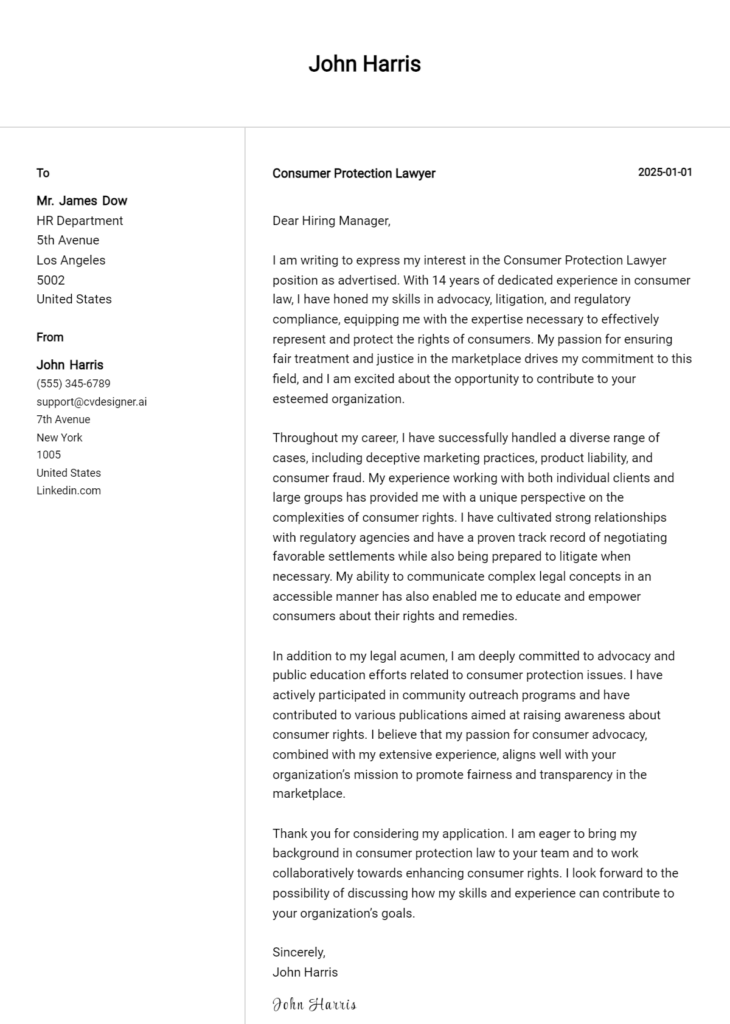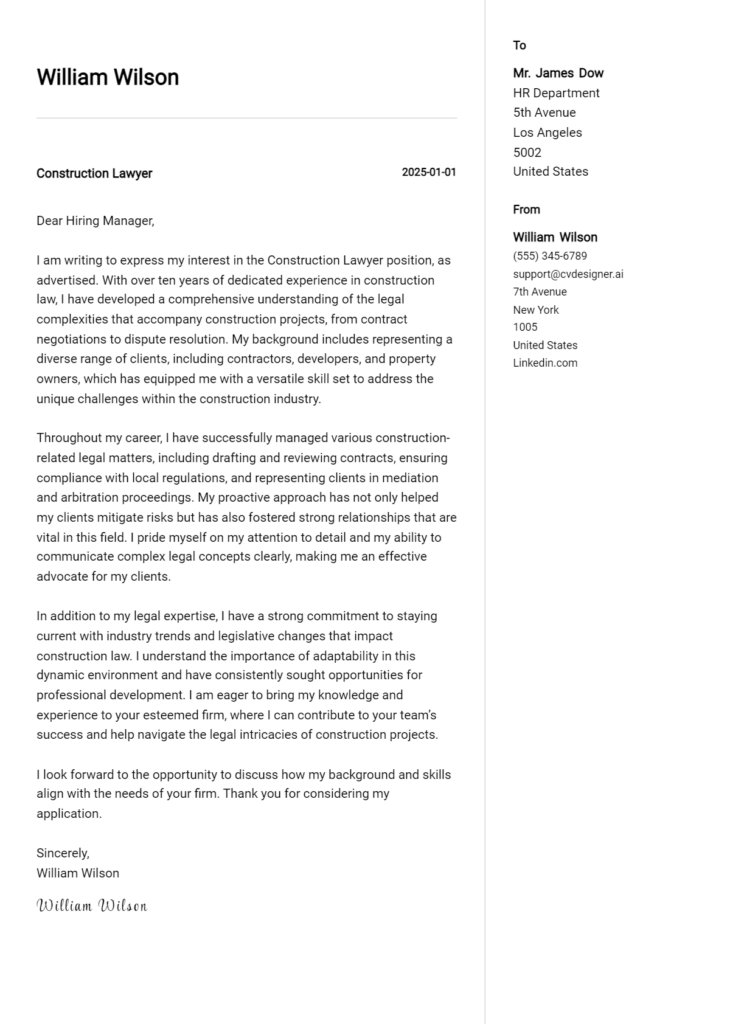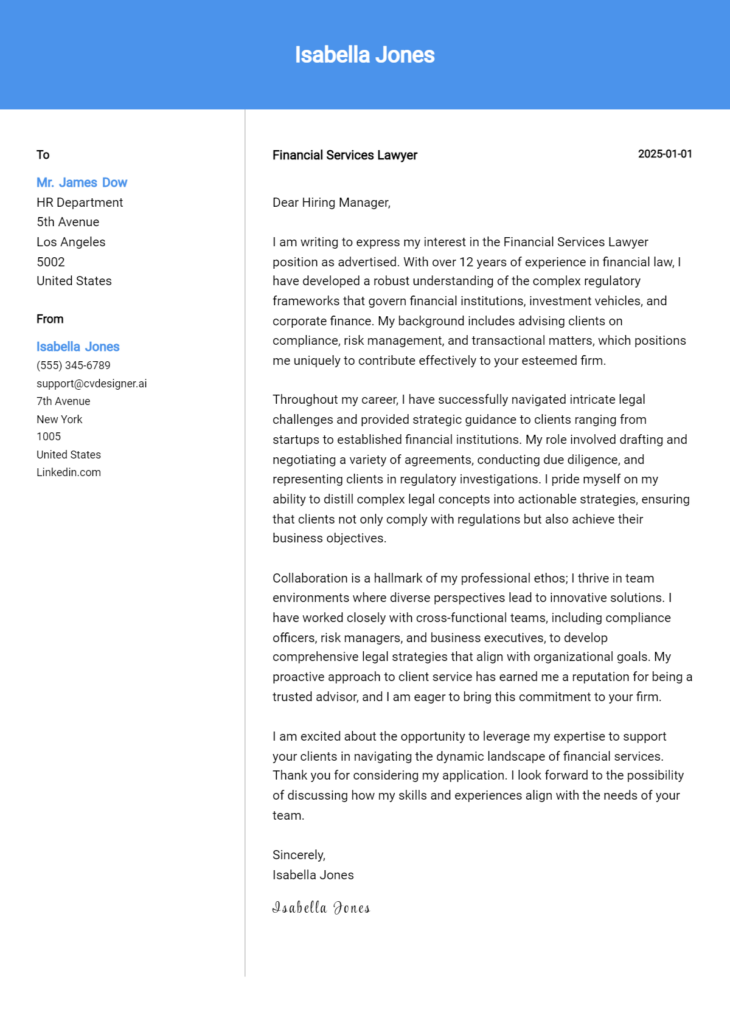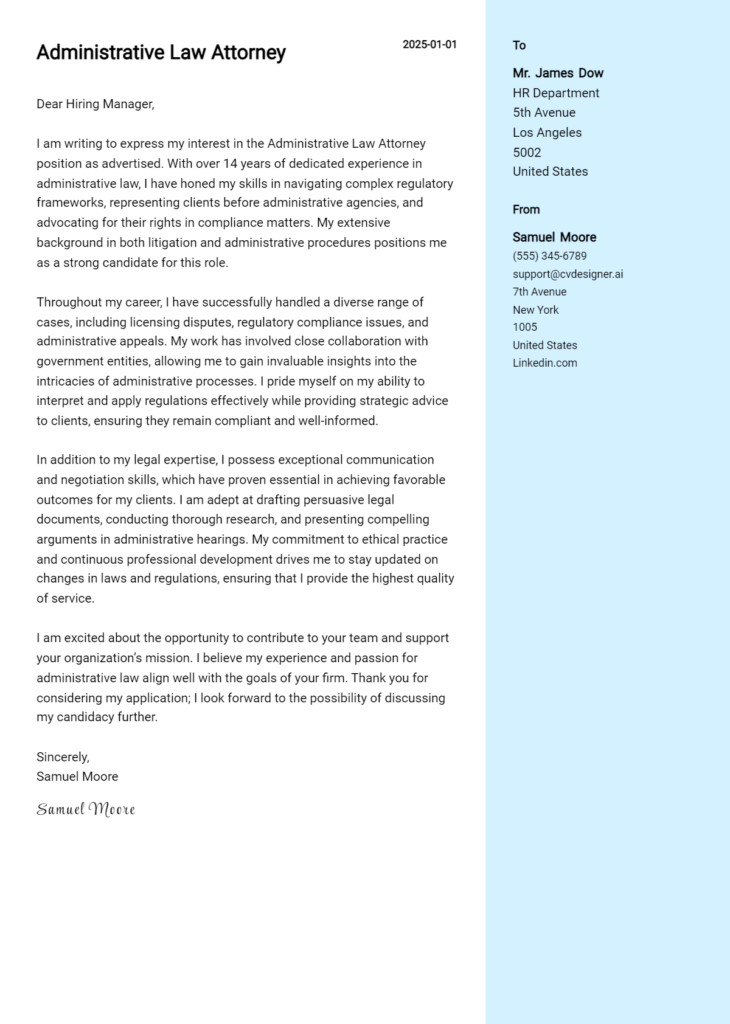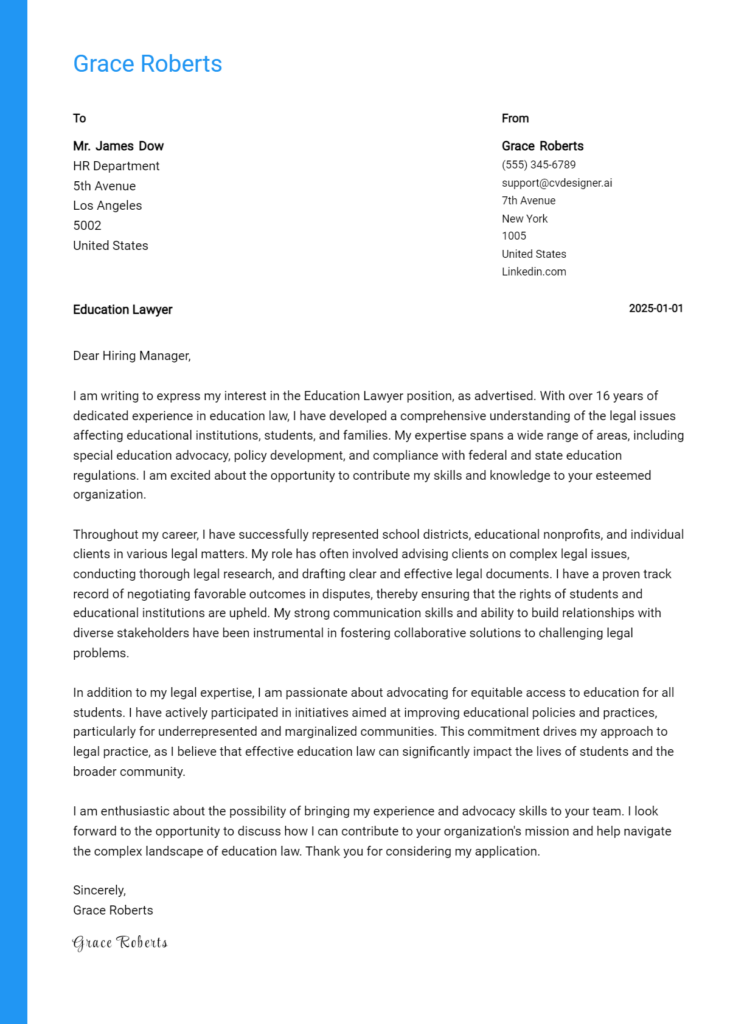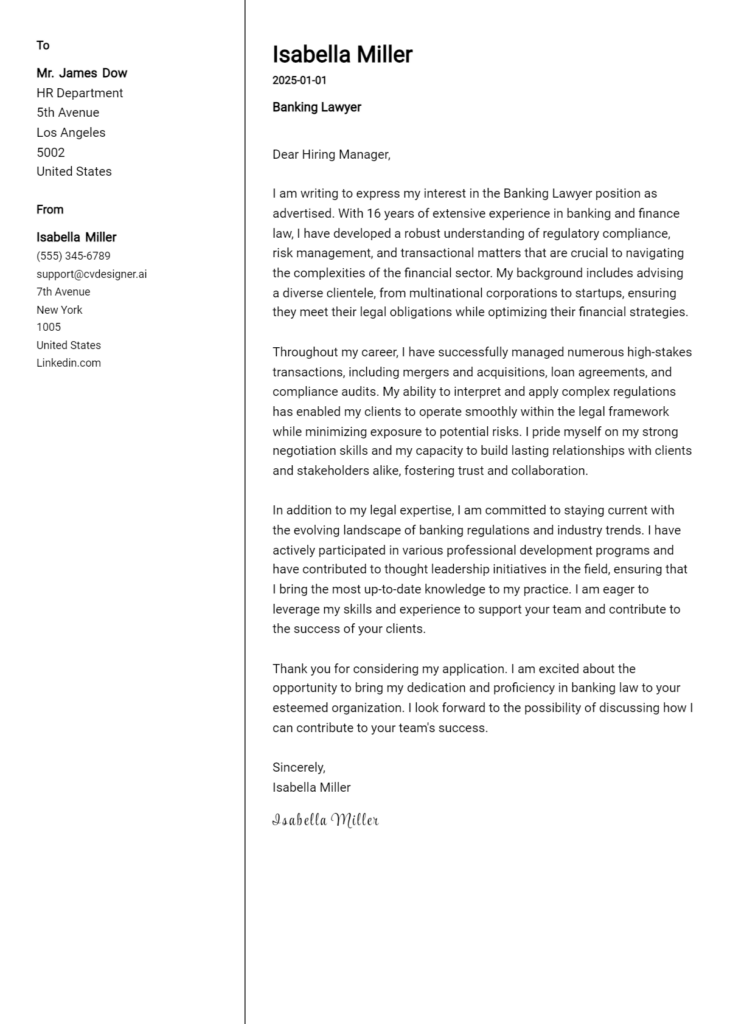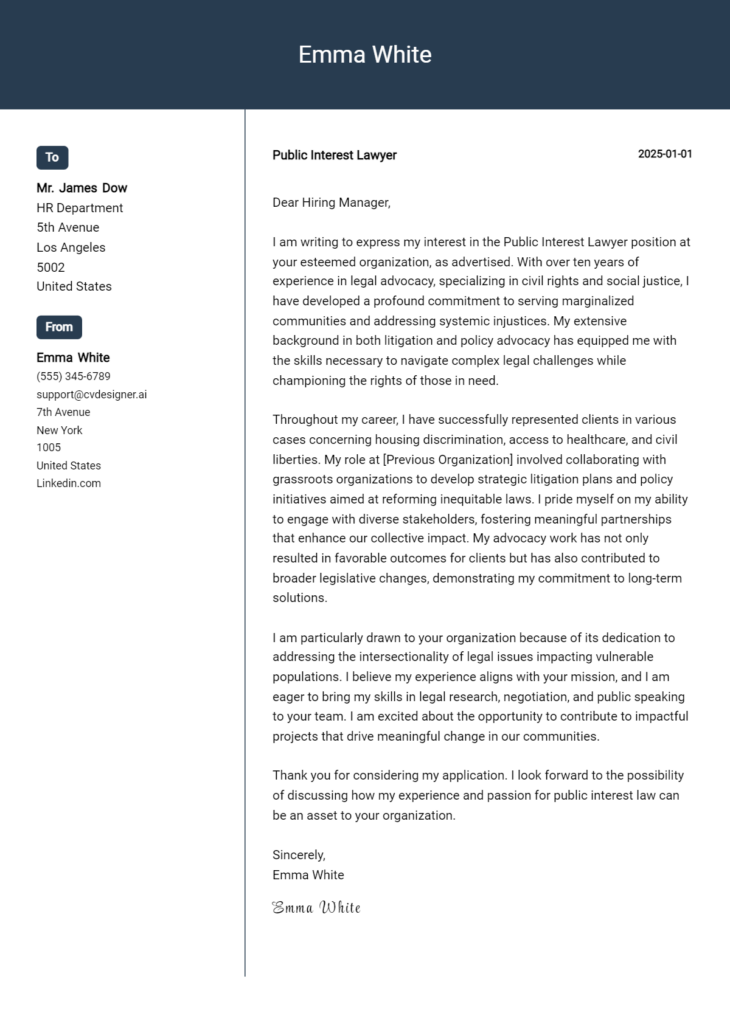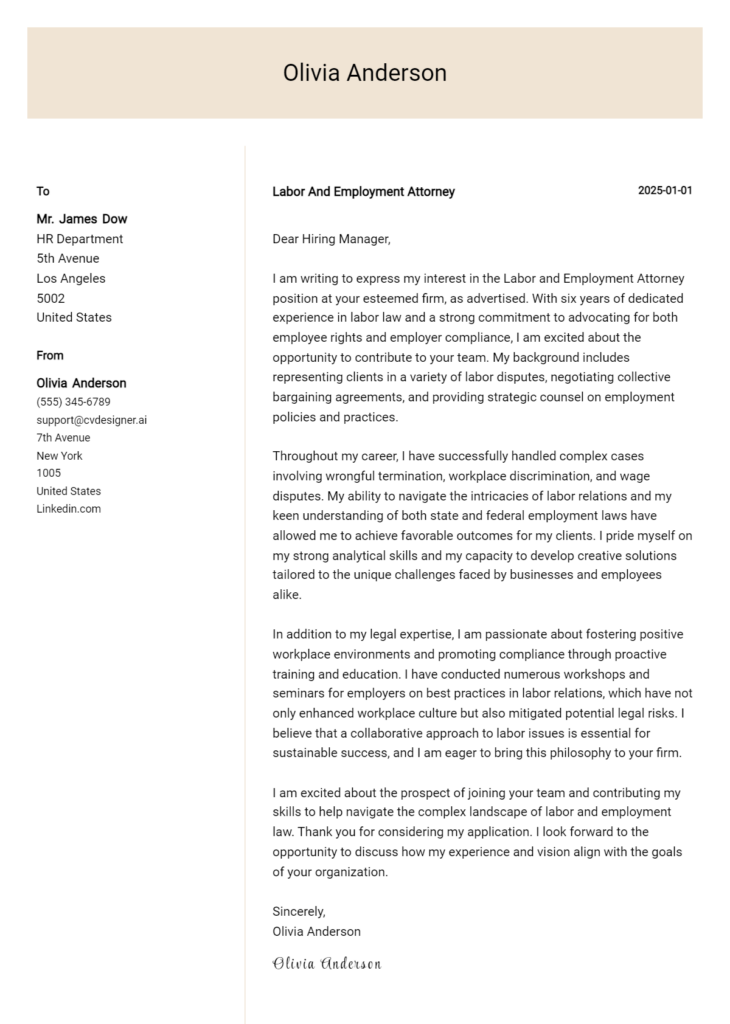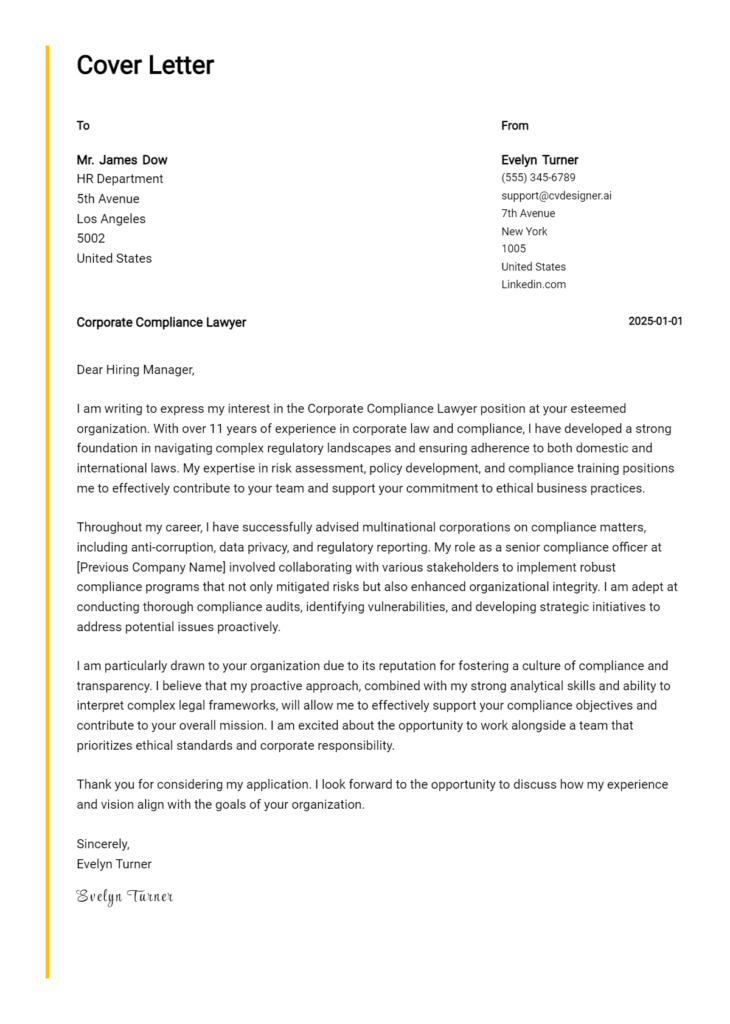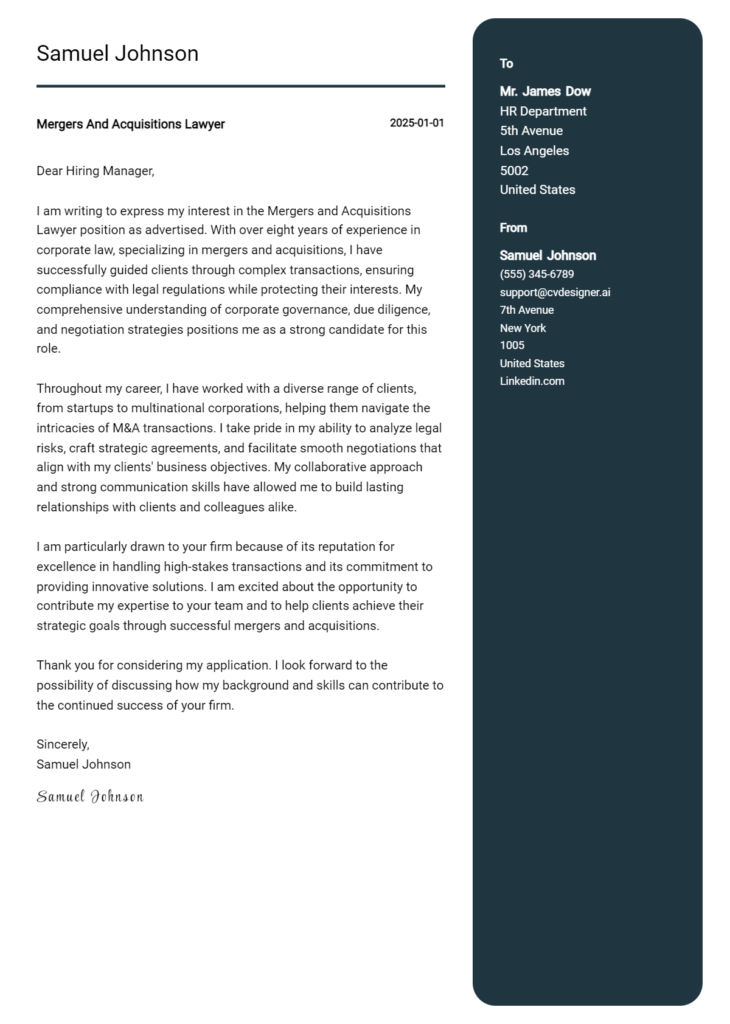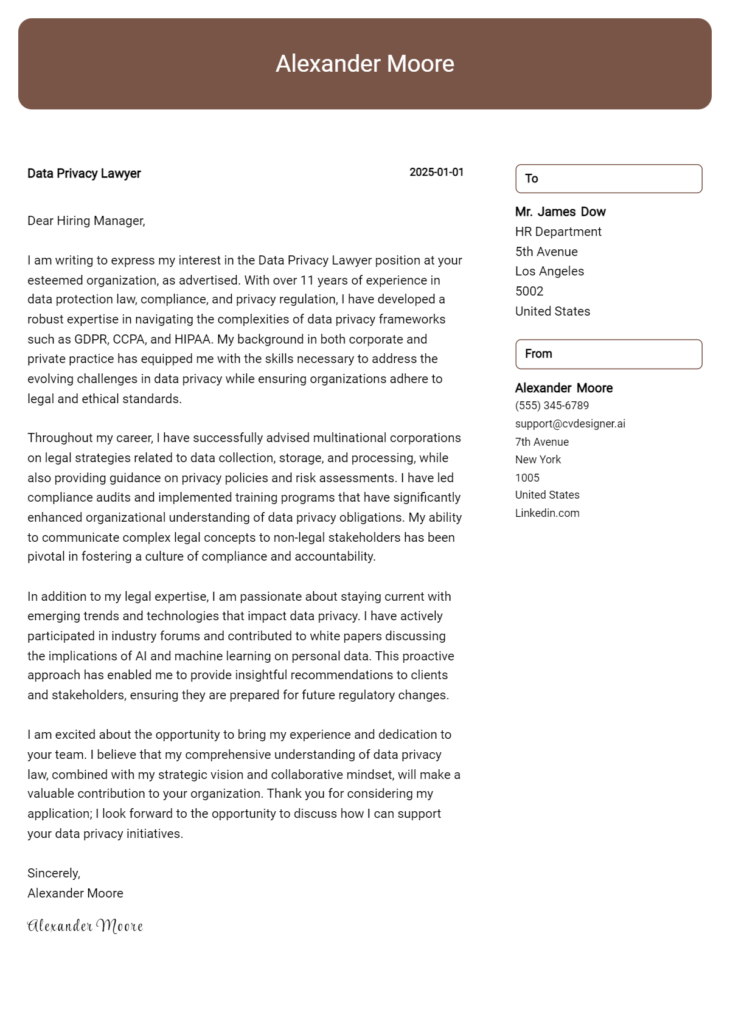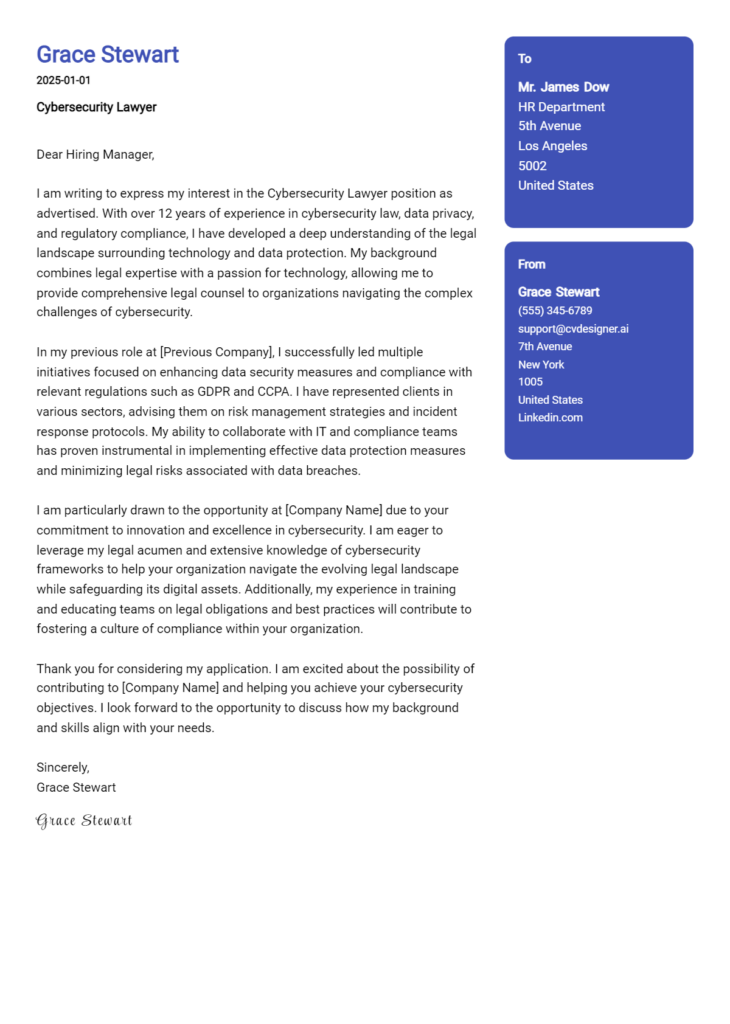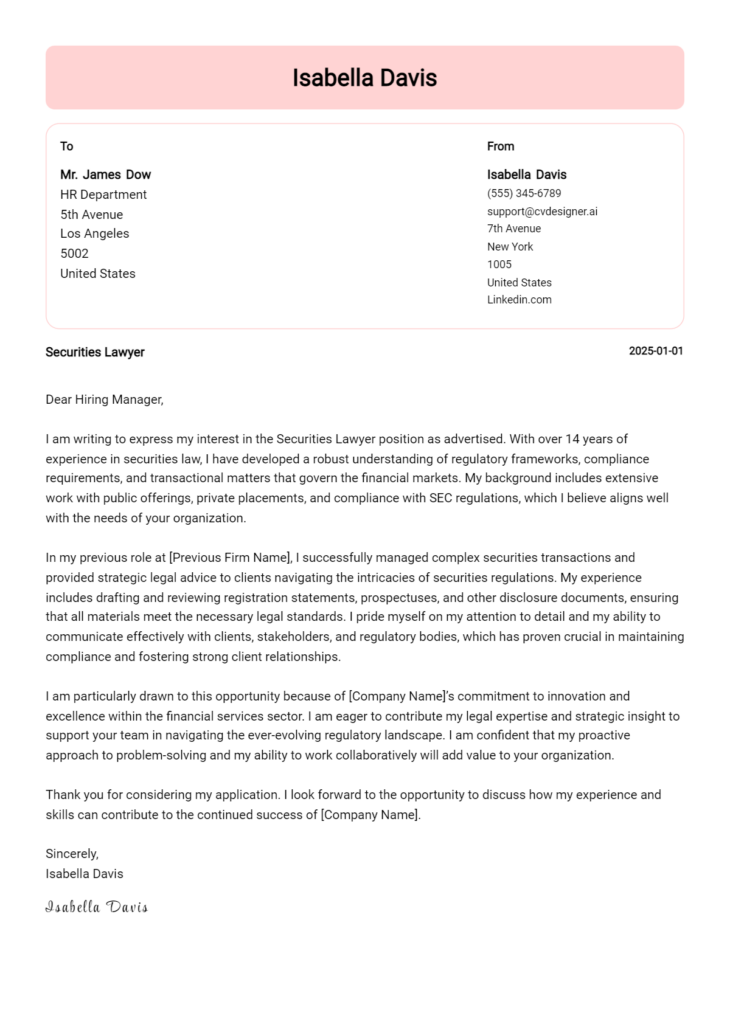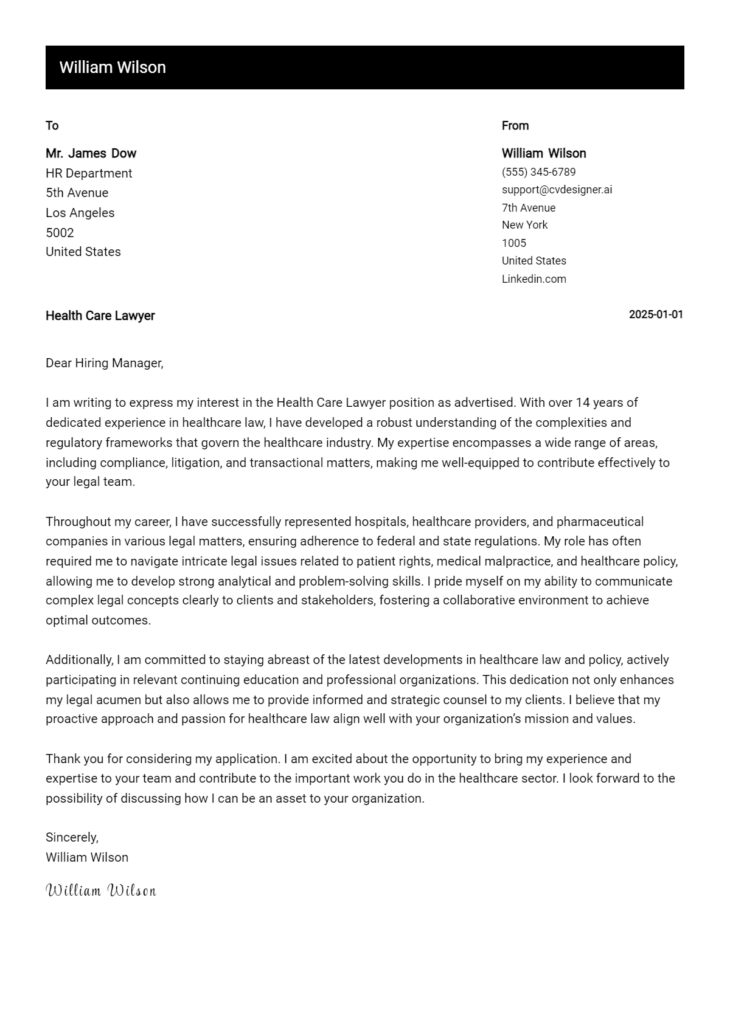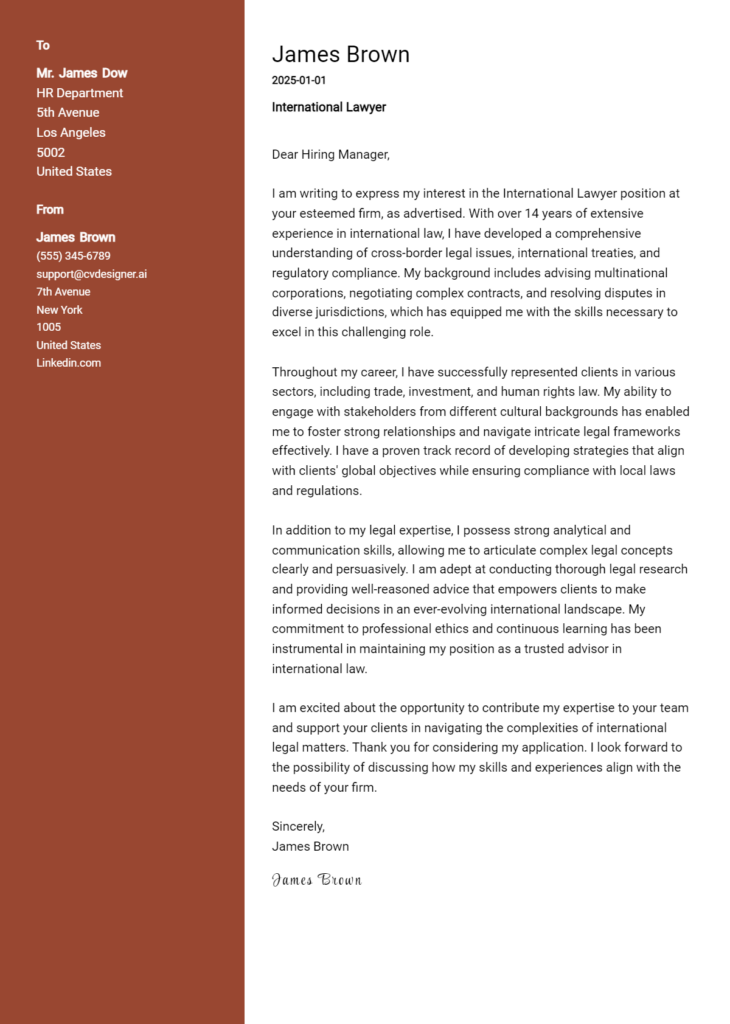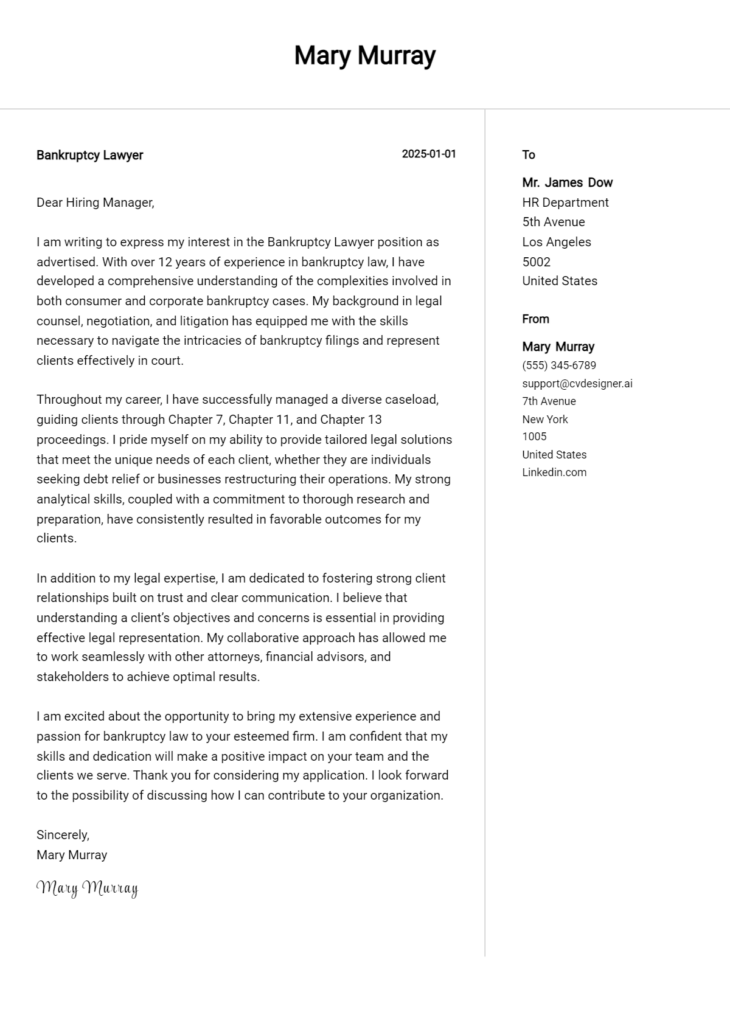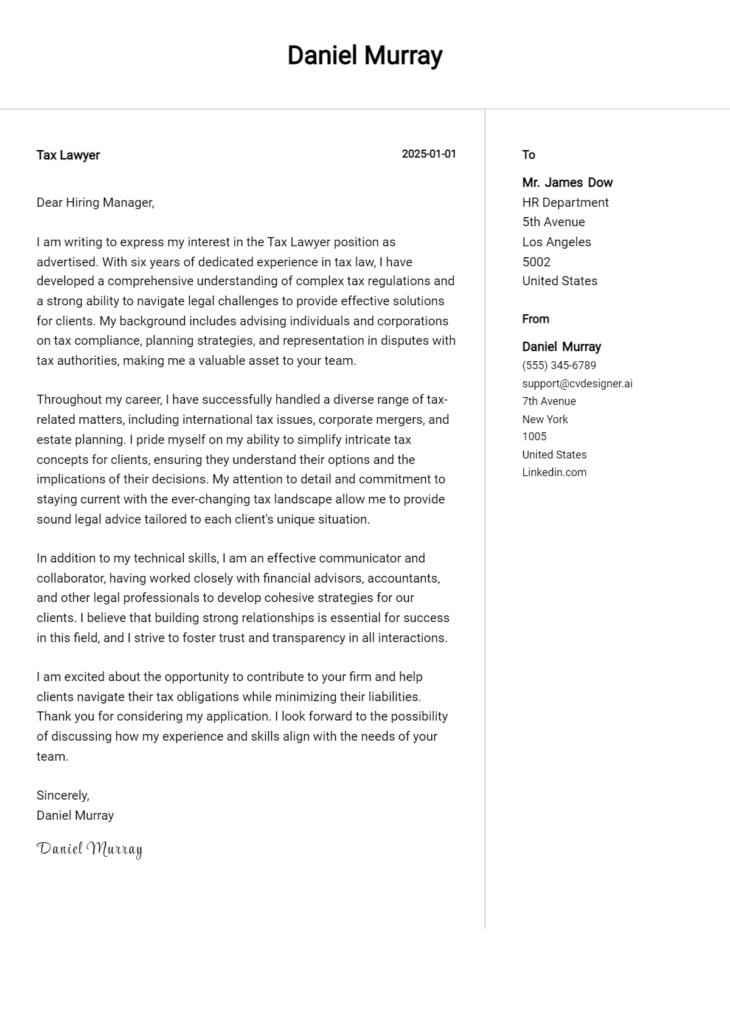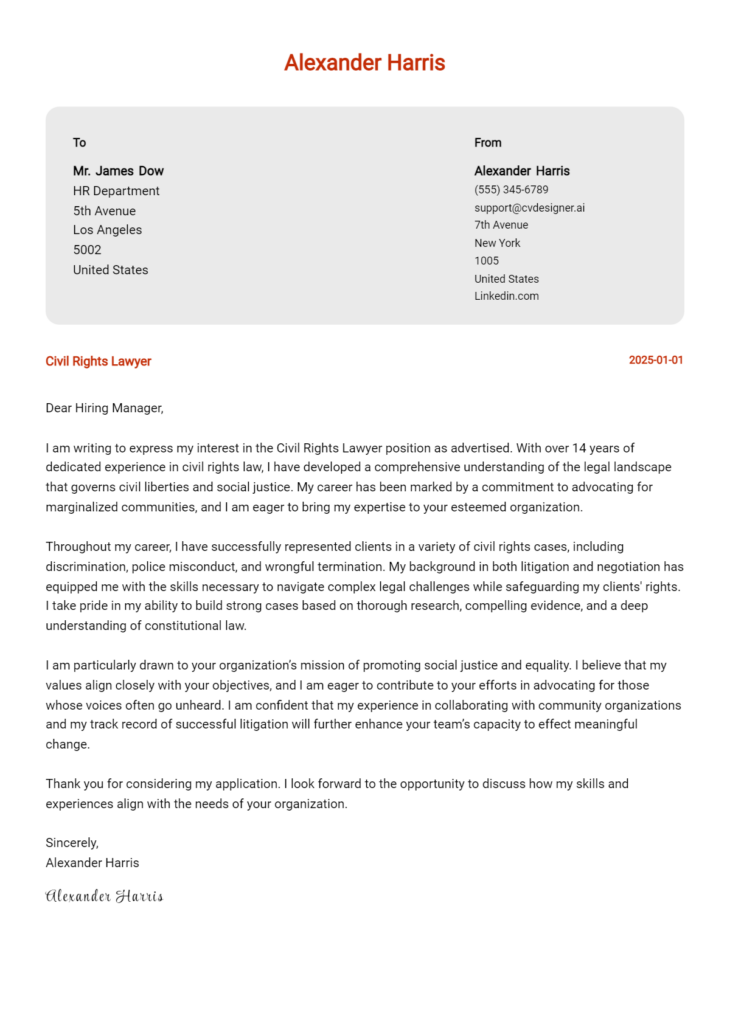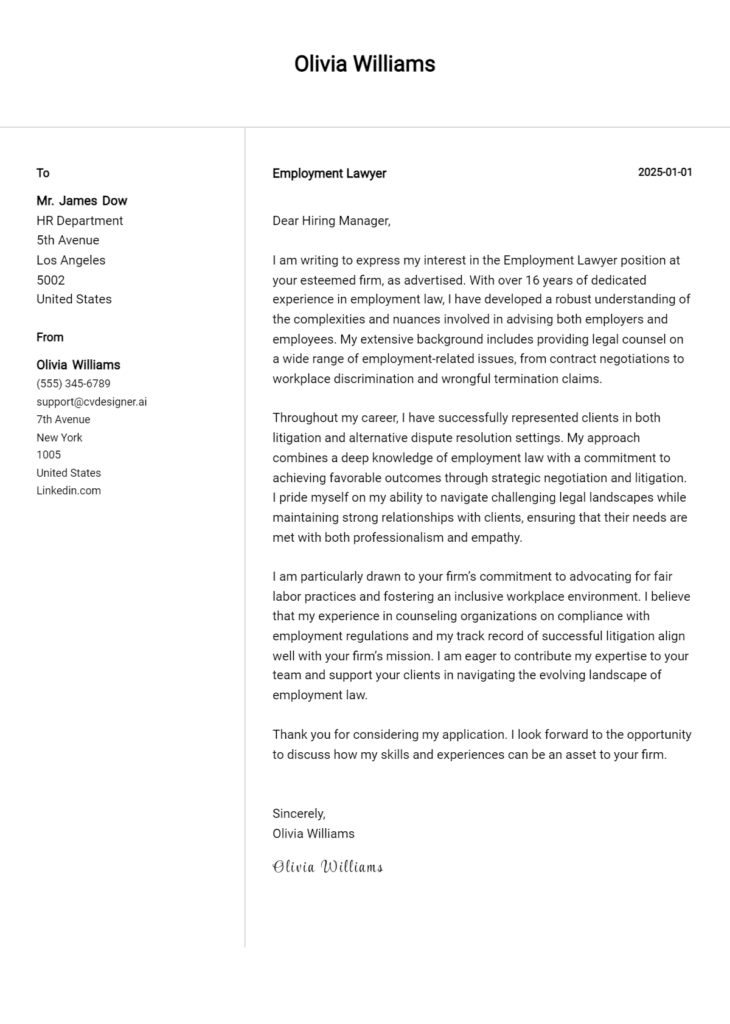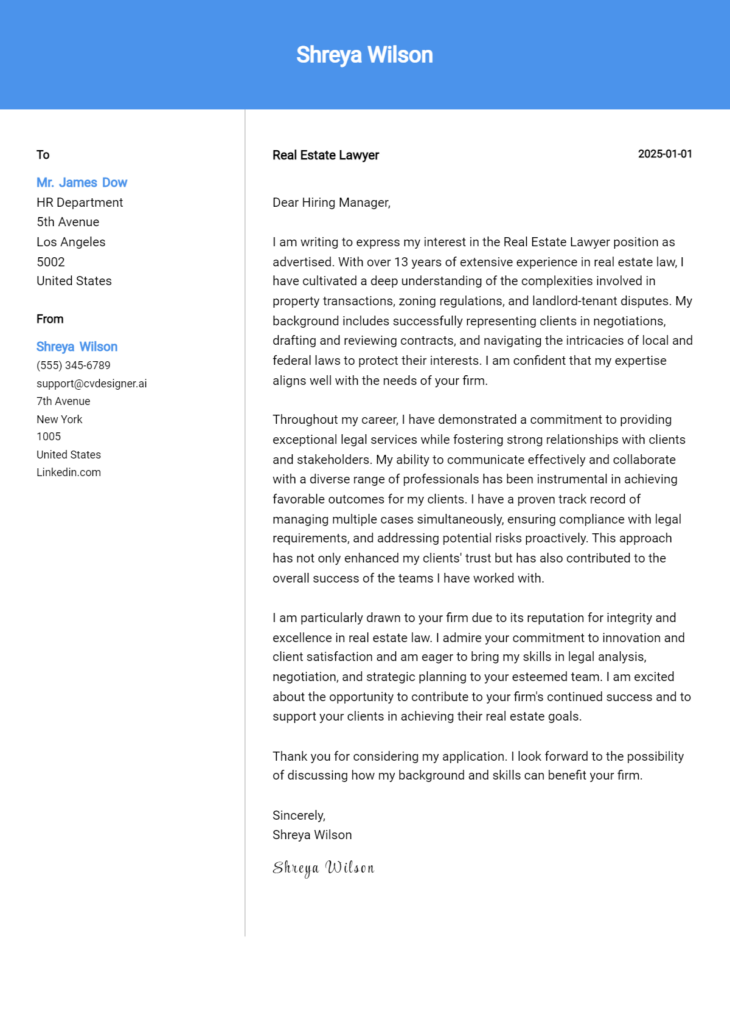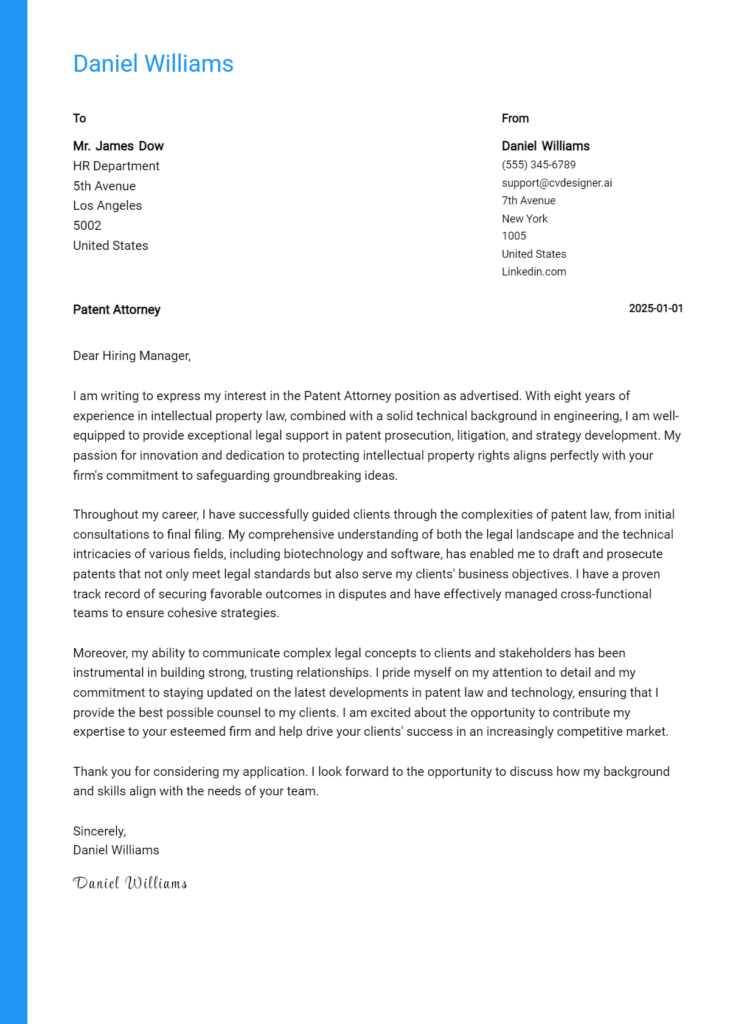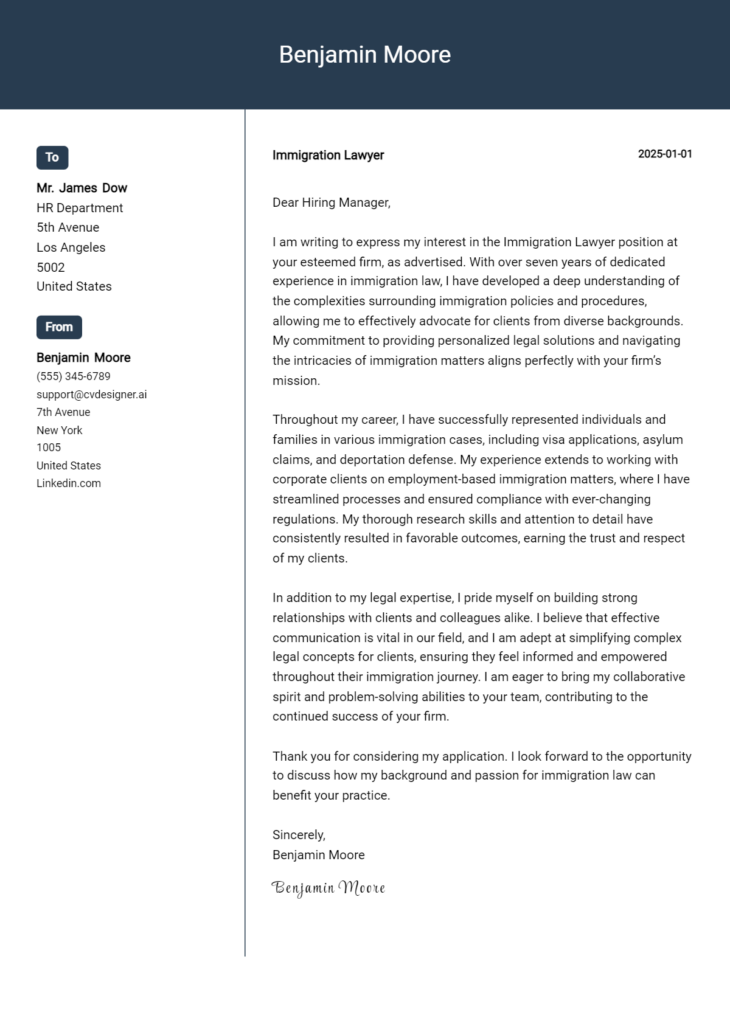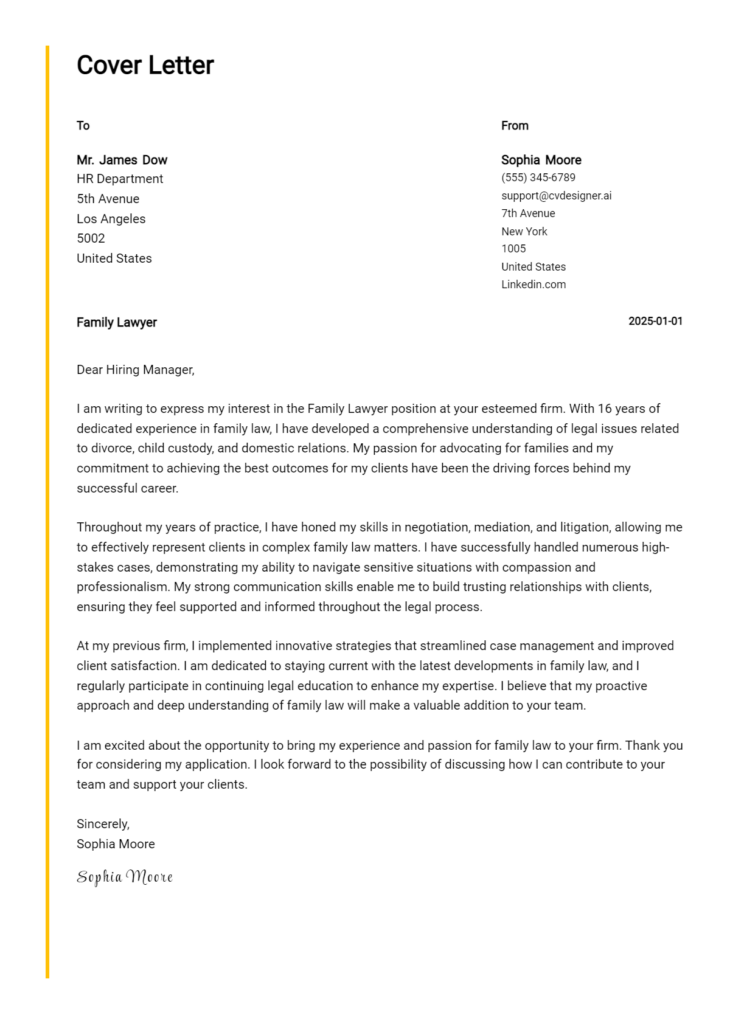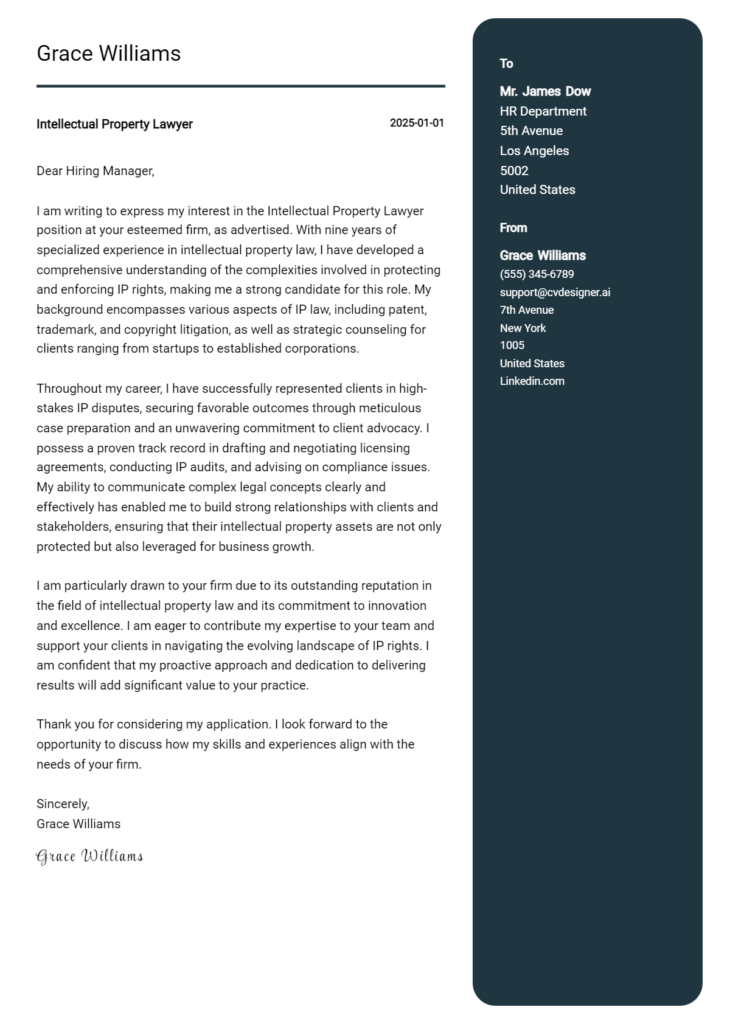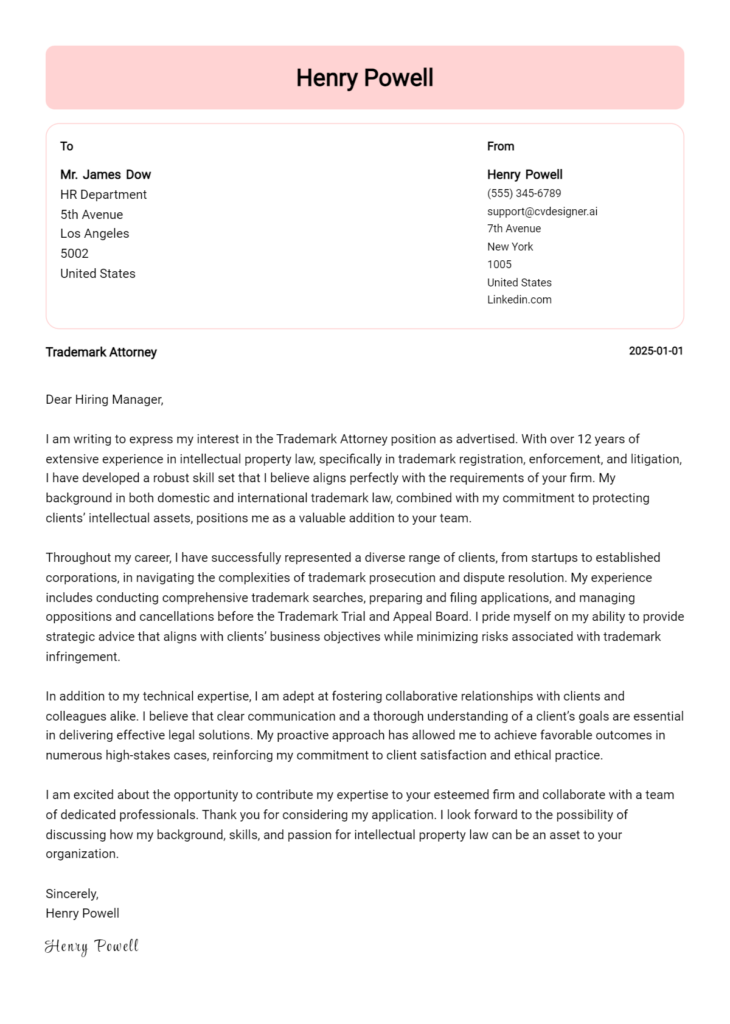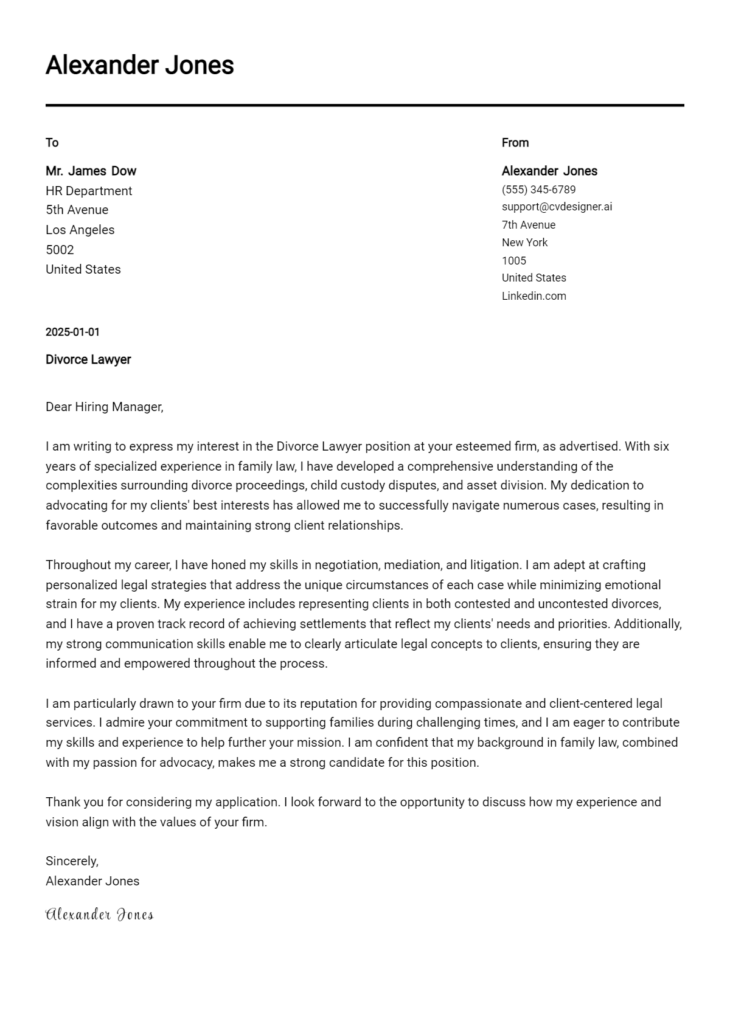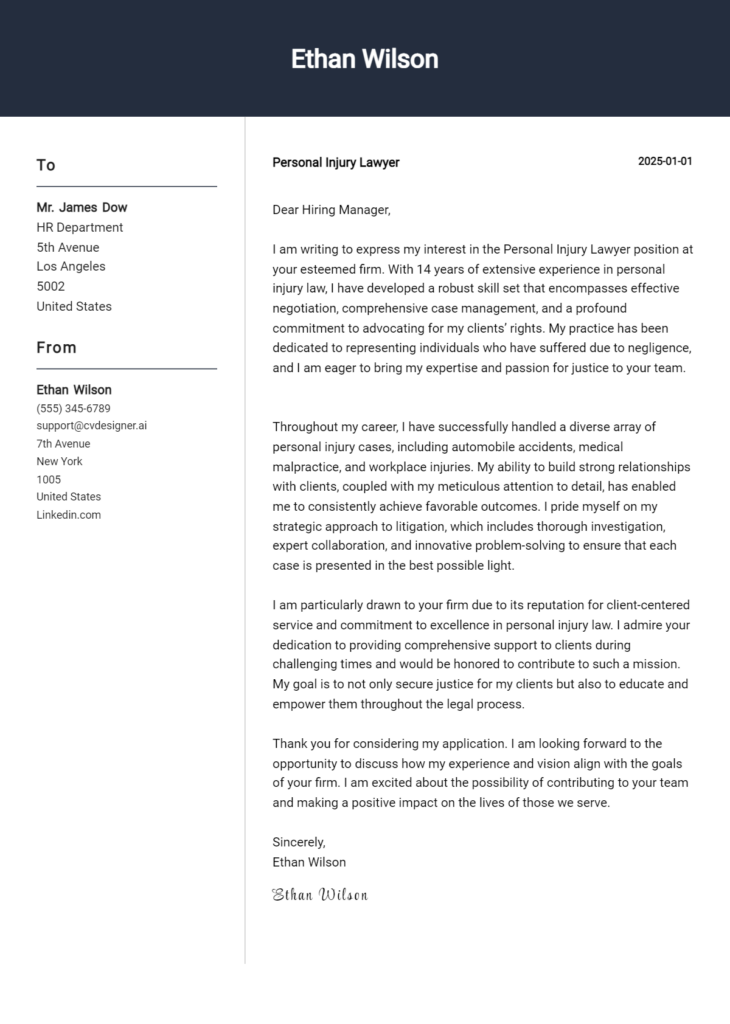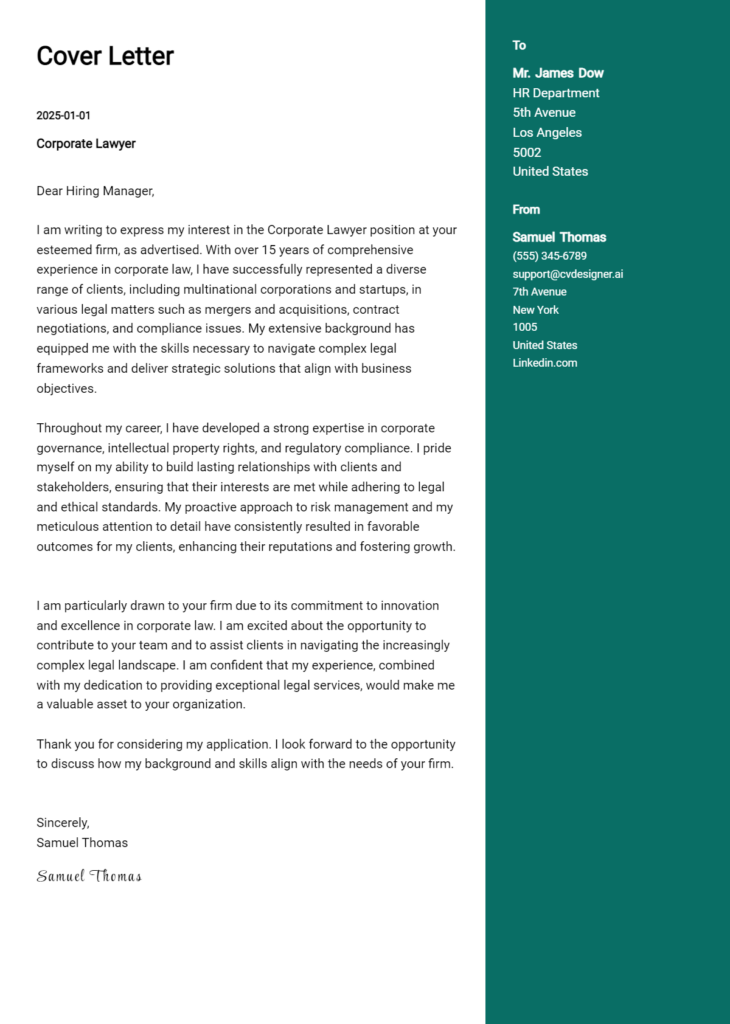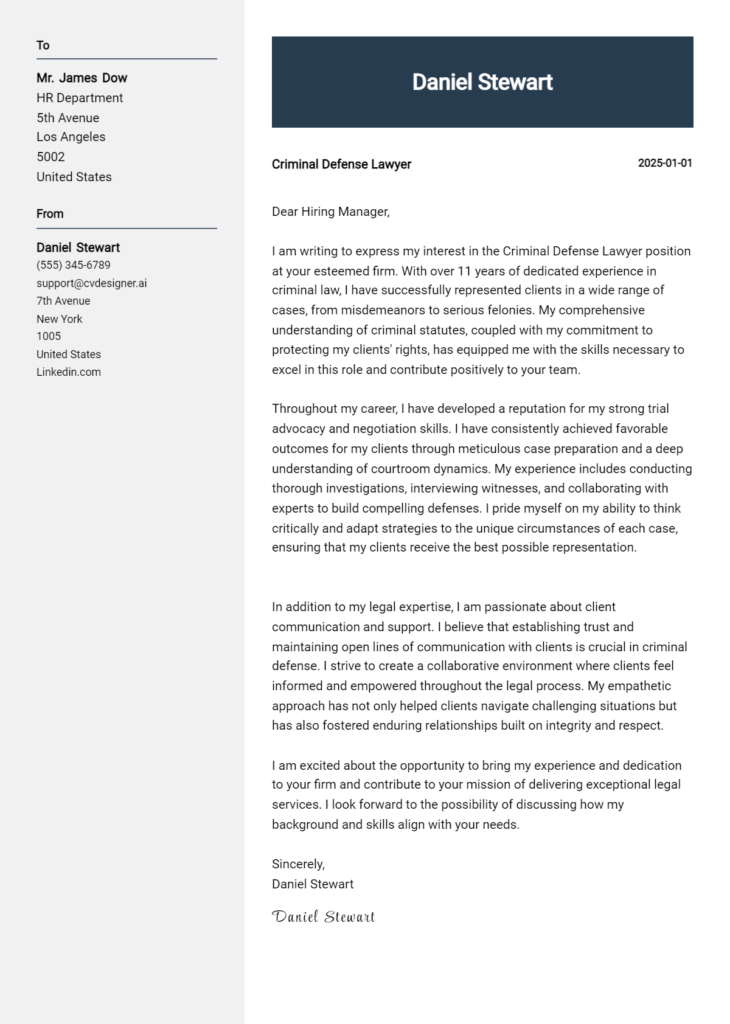Litigation Attorney Cover Letter Examples
Explore additional Litigation Attorney cover letter samples and guides and see what works for your level of experience or role.
How to Format a Litigation Attorney Cover Letter?
Crafting a compelling cover letter is essential for a Litigation Attorney, as it is not only a representation of your qualifications but also a demonstration of your legal acumen and communication skills. A well-structured cover letter can set you apart from other candidates, showcasing your ability to articulate complex arguments clearly and persuasively—an essential trait in the legal field. The formatting of your cover letter should reflect your professionalism and attention to detail, which are critical in litigation practice.
In this guide, we'll walk you through how to format your cover letter effectively, providing you with insights and examples tailored specifically for legal professionals.
We will focus on the key components of a professional cover letter, including:
- Cover Letter Header
- Cover Letter Greeting
- Cover Letter Introduction
- Cover Letter Body
- Cover Letter Closing
Each section is crucial for presenting your qualifications and demonstrating your commitment to the legal profession. Let’s break down each part and discuss how to make your Litigation Attorney cover letter stand out.
Importance of the Cover Letter Header for a Litigation Attorney
The cover letter header is a critical element of any professional correspondence, particularly for a Litigation Attorney. It sets the tone for the document and provides essential contact information that ensures clear communication. A well-structured header should include the attorney's name, address, phone number, email address, the date, and the recipient's details (including their name, title, and organization). Clarity and professionalism are vital, as they reflect the attorney's attention to detail and commitment to a polished presentation—traits that are paramount in the legal field.
A strong header conveys confidence and professionalism, while a weak one may leave a negative impression on potential employers or clients.
Strong Example:
John Smith, Esq. 123 Legal Lane Lawtown, NY 12345 (555) 123-4567 john.smith@email.com October 1, 2023 Jane Doe Hiring Manager XYZ Law Firm 456 Justice Blvd Lawtown, NY 12345
Weak Example:
John S. 123 St. NY 12345 555-1234 john@email 10/1/23 To Whom It May Concern
The Importance of the Cover Letter Greeting for a Litigation Attorney
The cover letter greeting is a critical element that sets the tone for the rest of your application. It demonstrates professionalism and personalization by addressing the hiring manager directly, making your letter feel more tailored and engaging. A well-crafted greeting can capture the reader's attention right from the start, while a generic or impersonal salutation may create a negative impression. To enhance your greeting, take the time to research the recipient's name, ensuring that you avoid overly common openings like "To Whom It May Concern." This small effort can show your dedication and attention to detail, both of which are essential qualities for a successful litigation attorney.
Strong Example
Dear Ms. Johnson,
Weak Example
To Whom It May Concern,
The Importance of a Well-Crafted Cover Letter Introduction for a Litigation Attorney
A well-crafted cover letter introduction is crucial for a Litigation Attorney, as it sets the tone for the rest of the application and serves as the first impression a candidate makes on the hiring manager. An effective introduction must capture the reader's attention, clearly convey the candidate's interest in the role, and succinctly highlight relevant skills or achievements that align with the job requirements. A strong opening can differentiate a candidate from the competition, while a weak introduction may fail to engage the reader, causing the application to be overlooked.
Strong Example
Dear [Hiring Manager's Name], As a dedicated litigation attorney with over seven years of experience successfully representing clients in complex civil litigation cases, I am excited to apply for the Litigation Attorney position at [Company Name]. My proven track record of securing favorable outcomes through meticulous research, strategic thinking, and outstanding negotiation skills has prepared me to contribute effectively to your esteemed firm. I am particularly drawn to [Company Name] because of its commitment to legal excellence and its innovative approach to client advocacy.
Weak Example
To Whom It May Concern, I am writing to apply for the Litigation Attorney position. I have some experience in litigation, and I think I would be good for the job. I have worked at a few law firms and handled different types of cases. I hope you consider my application.
Cover Letter Body for a Litigation Attorney
The body of a cover letter for a Litigation Attorney serves as a crucial platform for candidates to articulate their legal expertise, relevant experiences, and the unique value they bring to a potential employer. It allows candidates to highlight specific projects or accomplishments that demonstrate their capabilities in handling complex litigation cases, negotiating settlements, and presenting compelling arguments in court. By effectively showcasing their skills, candidates can create a persuasive narrative that aligns their background with the needs of the firm, ultimately enhancing their chances of being selected for an interview.
Strong Example
Dear [Hiring Manager's Name], I am writing to express my interest in the Litigation Attorney position at [Company Name]. With over seven years of experience in civil litigation, I have successfully represented clients in high-stakes cases, including a landmark case where I secured a $5 million settlement for a client wrongfully terminated. My ability to analyze complex legal issues and develop strategic arguments has consistently led to favorable outcomes in court. At my previous firm, I was recognized for my role in a multi-party litigation that involved extensive discovery and numerous depositions, ultimately resulting in a successful resolution for our client. I am excited about the opportunity to bring my skills in negotiation and advocacy to your esteemed firm, contributing to your team's success while ensuring the best outcomes for our clients. Sincerely, [Your Name]
Weak Example
Dear [Hiring Manager's Name], I am applying for the Litigation Attorney job at [Company Name]. I have worked in law for a few years and have done some litigation work. I think I can be a good fit for your firm. I once worked on a case where we tried to win a settlement, but I don't remember all the details. I believe my experience can help your firm, and I am looking forward to discussing this with you. Best, [Your Name]
Importance of the Cover Letter Closing for a Litigation Attorney
The closing paragraph of your cover letter is a critical component that can leave a lasting impression on potential employers. It serves as a summary of your qualifications, reiterates your enthusiasm for the role, and encourages the hiring manager to take the next steps, such as reviewing your resume or scheduling an interview. A strong closing not only reinforces your suitability for the position but also demonstrates your proactive approach and genuine interest in contributing to the firm’s success.
Strong Example
Thank you for considering my application for the Litigation Attorney position at [Law Firm Name]. With over five years of experience in complex litigation and a proven track record of securing favorable outcomes for clients, I am excited about the opportunity to bring my skills to your esteemed firm. I look forward to the possibility of discussing how my background, passion for advocacy, and commitment to excellence can contribute to the continued success of your team. I am eager to further explore this opportunity and am available at your earliest convenience for an interview.
Weak Example
I hope you like my application. I have some experience in litigation and I think I could be a good fit. Please let me know if you want to talk. I have attached my resume.
Crafting an effective cover letter is crucial for candidates applying for a Litigation Attorney position. A well-written cover letter not only highlights your qualifications but also provides a glimpse into your personality and passion for the legal field. To stand out in a competitive job market, it is essential to showcase your technical skills, problem-solving abilities, knowledge of the litigation process, teamwork experience, and commitment to continuous learning. Here are some tips to help you create an impactful cover letter that resonates with potential employers.
Tips for Writing a Cover Letter for a Litigation Attorney
Highlight Technical Skills: Clearly outline your technical skills relevant to litigation, such as knowledge of legal research tools, case management software, and familiarity with court procedures. Use specific examples to demonstrate how these skills have contributed to successful case outcomes in the past.
Showcase Problem-Solving Abilities: Litigation often involves complex issues requiring innovative solutions. Discuss instances where you identified legal challenges and formulated effective strategies to address them. This not only reflects your analytical skills but also your ability to think on your feet.
Demonstrate SDLC Knowledge: If applicable, mention your understanding of the Software Development Life Cycle (SDLC) and how it can impact legal cases, especially in tech-related litigation. Highlight your ability to communicate effectively with technical teams, which can be crucial in cases involving intellectual property or software disputes.
Emphasize Teamwork Experience: Litigation is rarely a solo endeavor; it often requires collaboration with clients, colleagues, and other stakeholders. Share experiences where you successfully worked as part of a team to achieve favorable outcomes, showcasing your interpersonal skills and ability to thrive in a collaborative environment.
Express a Passion for Continuous Learning: The legal landscape is constantly evolving, and demonstrating your commitment to professional development is vital. Mention any relevant certifications, courses, or workshops you have pursued, and how they have enhanced your expertise. This not only reflects your dedication but also your adaptability in a fast-paced field.
For additional resources, consider exploring various cover letter templates or using a cover letter builder to streamline the writing process.
Common Mistakes to Avoid in a Litigation Attorney Cover Letter
Crafting a compelling cover letter is essential for standing out in the competitive field of litigation. Avoiding common mistakes can significantly enhance your chances of making a positive impression on potential employers. Here are some frequent pitfalls to watch out for:
Generic Greetings: Using "To Whom It May Concern" can come off as impersonal. Instead, research and address the letter to a specific individual to demonstrate your interest in the firm.
Repetition of the Resume: A cover letter should complement your resume, not repeat it. Highlight key achievements and skills that align with the job description while providing context.
Lack of Specificity: Failing to mention specific cases or experiences relevant to litigation can weaken your appeal. Include concrete examples that showcase your expertise in the field.
Ignoring the Employer’s Needs: Not tailoring your letter to the specific firm and its values can diminish its impact. Show that you understand their practice areas and how you can contribute.
Poor Formatting: A cluttered or unattractive layout can be off-putting. Ensure your cover letter follows a professional cover letter format that is easy to read.
Neglecting Proofreading: Typos and grammatical errors can undermine your credibility as an attorney. Always proofread your letter and consider having someone else review it as well.
Failure to Include a Call to Action: Ending your letter without a strong closing statement can leave the reader wanting more. Invite them to discuss your application further or express enthusiasm for the opportunity.
By being mindful of these mistakes and looking at cover letter examples, you can create a powerful cover letter that effectively communicates your qualifications and passion for litigation.
Cover Letter FAQs for Litigation Attorney
What should I include in my cover letter as a Litigation Attorney?
When drafting your cover letter as a Litigation Attorney, focus on showcasing both your legal expertise and your ability to advocate effectively for clients. Start with a strong introduction that specifies the position you're applying for and how you found the opportunity. Highlight your relevant experience in litigation, including specific cases you've handled or areas of law you've specialized in, such as commercial or criminal litigation. Discuss your skills in research, negotiation, and courtroom presentation. Additionally, convey your understanding of the firm’s values and how you align with them, demonstrating your enthusiasm for the role and the organization.
How can I demonstrate my litigation skills in my cover letter?
To effectively demonstrate your litigation skills in your cover letter, provide concrete examples from your career. Mention specific cases where you successfully represented clients, emphasizing your role in case strategy, legal research, or trial preparation. Include metrics, such as favorable verdicts or settlements achieved, to quantify your success. Additionally, discuss your familiarity with relevant legal procedures and rules of evidence, as well as your ability to collaborate with clients, witnesses, and experts. By showcasing your achievements and providing context, you can clearly convey your litigation capabilities to potential employers.
Should I address my cover letter to a specific person?
Yes, addressing your cover letter to a specific person is highly recommended. It demonstrates your attention to detail and genuine interest in the position. Research the firm’s website or LinkedIn to identify the hiring manager or the head of the litigation department. If you cannot find a name, using a general salutation like "Dear Hiring Committee" is acceptable, but it is always better to personalize your greeting. A tailored introduction helps create a connection with the reader and sets a positive tone for your application, making it more likely to stand out among other candidates.
How long should my cover letter be?
Your cover letter should ideally be one page long, typically consisting of three to four paragraphs. Aim for a concise and focused presentation of your qualifications and interest in the position. Start with an engaging introduction, followed by a couple of paragraphs detailing your relevant experience, skills, and accomplishments in litigation. Conclude with a strong closing statement that reiterates your enthusiasm for the role and your desire to contribute to the firm. Keep your writing clear and professional, avoiding overly complex language, and ensure that your cover letter complements your resume rather than repeating its content.
Build your Cover Letter in minutes
Use an AI-powered cover letter builder and have your letter done in 5 minutes. Just select your template and our software will guide you through the process.

